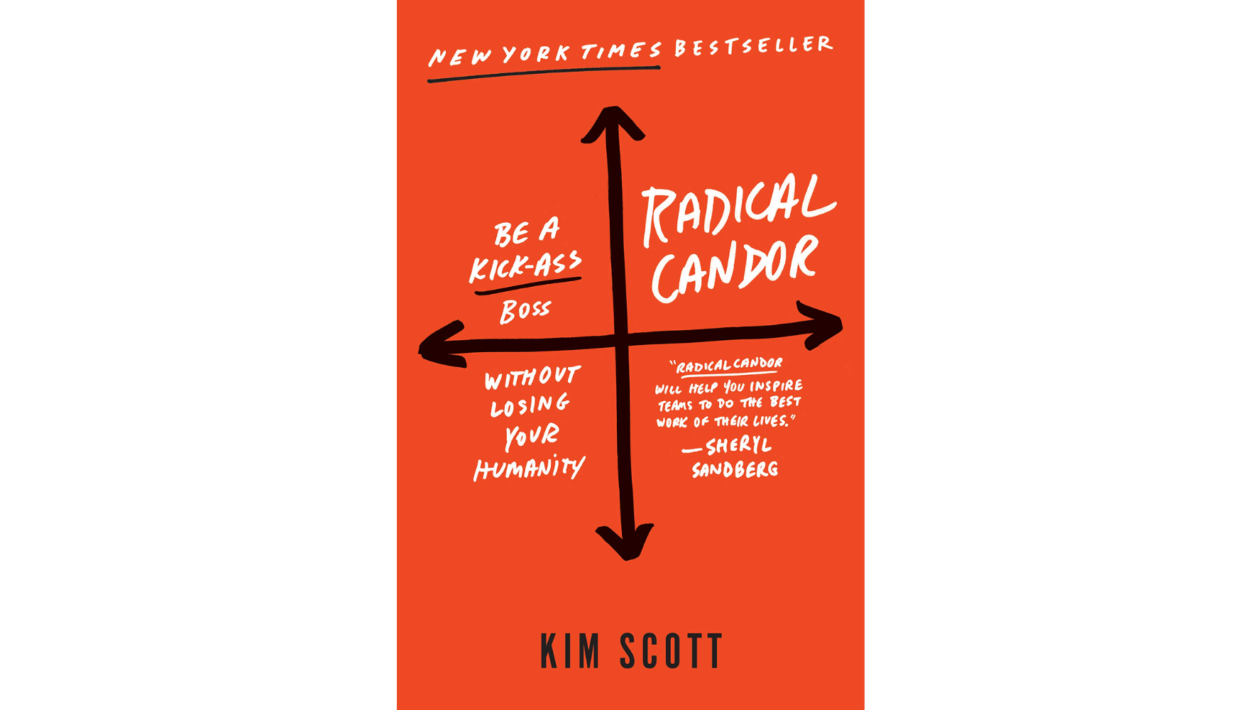By K. Scott
New York, NY: St. Martin’s Press (2017)
Kindle edition
Reviewed by SCOTT MOORE
St. Martin’s Press and Kim Scott have given us the challenge to become more direct in our communications to avoid frustration and become more productive as a team. The ultimate goal of Radical Candor is to collaboratively achieve what you cannot achieve as an individual (loc. 1506). For this collaboration to occur, there must be a high level of trust within the team (loc. 349).
Radical Candor is divided into two segments. The first segment discusses Scott’s 25 years of work experiences, both successes and failures, as is built into the concept of Radical Candor. The second section builds on the first, enabling leaders to incorporate the first section’s core ideas into the workplace.
The title of the book encapsulates its contents. Scott defines the title, stating that “radical” was chosen because “so many of us are conditioned to avoid saying what we really think” (loc. 349). The tendency to avoid is an adaptive social behavior that helps individuals avoid conflict and embarrassment; however, in a boss, this “kind of avoidance is disastrous” (loc. 349). “Candor” was used because the “key to getting everyone used to being direct when challenging each other (and you!) is emphasizing that it’s necessary to communicate clearly enough so that there’s no room for interpretation” (loc. 348). Scott emphasizes that without radical candor, the openness necessary for a company to maximize their employee’s potential is limited.
Scott expressly communicates that each member should be in roles that enable their personal life goals to be met for a team to reach its full potential. For this to happen, there must be recognition of each employee’s ambition. This can be best gained by a relationship beyond what you, as the manager, wants to get out of the person, into an understanding of what the team member wants to get out of life. When the team member’s life and work goals intersect, there is fulfillment for the team member, and both the employer and team member get the most out of their relationship. In this context, Scott suggests that shifting “from a traditional ‘talent management’ mindset to one of ‘growth management’ will help you ensure that everyone on your team is moving in the direction of their dreams, ensuring that your team collectively improves over time” (loc. 1026). The manager’s job is not to provide meaning for team members but to get to know them well enough to decipher how they get meaning from their work, thus placing them in positions most apt to fulfill them as a whole person.
Radical Candor has much to offer the Christian leadership community. Scott draws out principles that, if applied, will be an asset for Christian leaders who are striving for excellence in both their product output and their team member’s wellbeing. The Bible says that we should consider the needs of others and ourselves (Phil. 2:4). This biblical concept finds its fulfillment in the “growth management” aspect of the book. Additionally, the collaborative approach described in the book appeals to many levels of leadership. While I would like to have seen the author apply these principles in a volunteer-type organization, the book was written plainly enough, and the principles were delineated sufficiently well for a leader of volunteers to understand and incorporate them into their leadership style.
The principles found within the book are easily applied to a church setting due to the lack of “manager” focus and the thrust of “people focus.” The book’s trajectory was to foster an environment of openness and candid expression among individuals who work with each other. These principles can be applied in a church setting, thereby enabling an atmosphere that has the potential to be less judgmental and more seeker friendly.
The language used within the book to enhance the author’s emphasis may be a weakness in writing for the Christian reader. The title itself gives the impression of an “in your face” read, and that is where the book’s radical candor is shown. Saying what needs to be said is a must. The essential principles found in Radical Candor foster a collaborative effort to maximize an organization’s potential—secular or religious.
I would recommend Radical Candor to anyone ready for a collaborative, radical, and candid leadership approach that enables team members to achieve and exceed their own personal career goals.
SCOTT MOORE is the pastor of the Lady Lake, FL, and Leesburg, FL, Seventh-day Adventist Churches. He lives in Weirsdale, FL.

